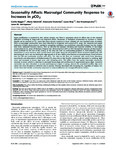Seasonality Affects Macroalgal Community Response to Increases in pCO2
| dc.contributor.author | Baggini, C | |
| dc.contributor.author | Salomidi, M | |
| dc.contributor.author | Voutsinas, E | |
| dc.contributor.author | Bray, L | |
| dc.contributor.author | Krasakopoulou, E | |
| dc.contributor.author | Hall-Spencer, Jason | |
| dc.date.accessioned | 2015-12-12T17:13:48Z | |
| dc.date.available | 2015-12-12T17:13:48Z | |
| dc.date.issued | 2014-09-03 | |
| dc.identifier.issn | 1932-6203 | |
| dc.identifier.issn | 1932-6203 | |
| dc.identifier.other | ARTN e106520 | |
| dc.identifier.uri | http://hdl.handle.net/10026.1/3941 | |
| dc.description.abstract |
Ocean acidification is expected to alter marine systems, but there is uncertainty about its effects due to the logistical difficulties of testing its large-scale and long-term effects. Responses of biological communities to increases in carbon dioxide can be assessed at CO2 seeps that cause chronic exposure to lower seawater pH over localised areas of seabed. Shifts in macroalgal communities have been described at temperate and tropical pCO2 seeps, but temporal and spatial replication of these observations is needed to strengthen confidence our predictions, especially because very few studies have been replicated between seasons. Here we describe the seawater chemistry and seasonal variability of macroalgal communities at CO2 seeps off Methana (Aegean Sea). Monitoring from 2011 to 2013 showed that seawater pH decreased to levels predicted for the end of this century at the seep site with no confounding gradients in Total Alkalinity, salinity, temperature or wave exposure. Most nutrient levels were similar along the pH gradient; silicate increased significantly with decreasing pH, but it was not limiting for algal growth at all sites. Metal concentrations in seaweed tissues varied between sites but did not consistently increase with pCO2. Our data on the flora are consistent with results from laboratory experiments and observations at Mediterranean CO2 seep sites in that benthic communities decreased in calcifying algal cover and increased in brown algal cover with increasing pCO2. This differs from the typical macroalgal community response to stress, which is a decrease in perennial brown algae and proliferation of opportunistic green algae. Cystoseira corniculata was more abundant in autumn and Sargassum vulgare in spring, whereas the articulated coralline alga Jania rubens was more abundant at reference sites in autumn. Diversity decreased with increasing CO2 regardless of season. Our results show that benthic community responses to ocean acidification are strongly affected by season. | |
| dc.format.extent | e106520-e106520 | |
| dc.format.medium | Electronic-eCollection | |
| dc.language | en | |
| dc.language.iso | eng | |
| dc.publisher | Public Library of Science (PLoS) | |
| dc.subject | Acids | |
| dc.subject | Aquatic Organisms | |
| dc.subject | Carbon Dioxide | |
| dc.subject | Ecosystem | |
| dc.subject | Mediterranean Region | |
| dc.subject | Oceans and Seas | |
| dc.subject | Seasons | |
| dc.subject | Seawater | |
| dc.subject | Seaweed | |
| dc.subject | Weather | |
| dc.title | Seasonality Affects Macroalgal Community Response to Increases in pCO2 | |
| dc.type | journal-article | |
| dc.type | Journal Article | |
| dc.type | Research Support, Non-U.S. Gov't | |
| plymouth.author-url | https://www.webofscience.com/api/gateway?GWVersion=2&SrcApp=PARTNER_APP&SrcAuth=LinksAMR&KeyUT=WOS:000341257700082&DestLinkType=FullRecord&DestApp=ALL_WOS&UsrCustomerID=11bb513d99f797142bcfeffcc58ea008 | |
| plymouth.issue | 9 | |
| plymouth.volume | 9 | |
| plymouth.publication-status | Published online | |
| plymouth.journal | PLoS ONE | |
| dc.identifier.doi | 10.1371/journal.pone.0106520 | |
| plymouth.organisational-group | /Plymouth | |
| plymouth.organisational-group | /Plymouth/Faculty of Science and Engineering | |
| plymouth.organisational-group | /Plymouth/Faculty of Science and Engineering/School of Biological and Marine Sciences | |
| plymouth.organisational-group | /Plymouth/PRIMaRE Publications | |
| plymouth.organisational-group | /Plymouth/REF 2021 Researchers by UoA | |
| plymouth.organisational-group | /Plymouth/REF 2021 Researchers by UoA/UoA07 Earth Systems and Environmental Sciences | |
| plymouth.organisational-group | /Plymouth/Research Groups | |
| plymouth.organisational-group | /Plymouth/Research Groups/Marine Institute | |
| plymouth.organisational-group | /Plymouth/Users by role | |
| plymouth.organisational-group | /Plymouth/Users by role/Academics | |
| dc.publisher.place | United States | |
| dcterms.dateAccepted | 2014-08-02 | |
| dc.identifier.eissn | 1932-6203 | |
| dc.rights.embargoperiod | Not known | |
| rioxxterms.versionofrecord | 10.1371/journal.pone.0106520 | |
| rioxxterms.licenseref.uri | http://www.rioxx.net/licenses/all-rights-reserved | |
| rioxxterms.licenseref.startdate | 2014 | |
| rioxxterms.type | Journal Article/Review |


